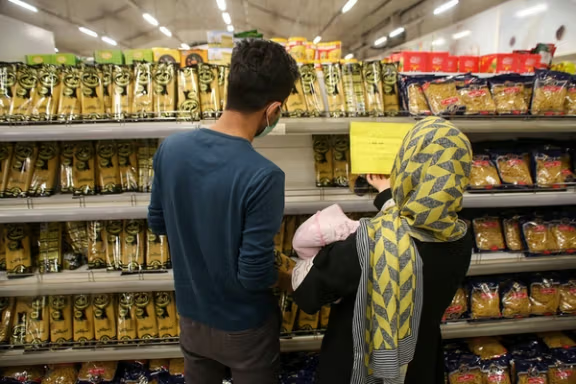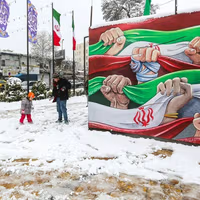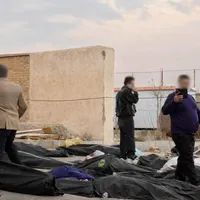The struggle between Iranian women and the defenders of compulsory hijab — backed by state media platforms, clerical power, and security forces on the streets — has moved beyond hair.
In recent months, men aligned with the Islamic Republic have begun attacking what they call women’s “belly-button display,” treating it as a new sign of defiance.
As the government tightens pressure through campaigns such as the “Chastity and Hijab Situation Room,” reportedly supported by more than 80,000 morality enforcers, pro-establishment theorists have escalated their rhetoric.
Their comments reveal how unsettled they are by the idea that women might freely decide what to wear—something many women’s rights activists see as the first step toward true freedom.
In one of the most controversial remarks, Hassan Rahimpour Azghadi, a member of the Supreme Council of the Cultural Revolution, shifted a panel on the 12-day war between Iran and Israel toward hijab enforcement.
“There was a time when the hijab problem was just hair. Now you walk down the street and you see both babes and belly buttons!" he said.
Before him, former parliament vice-speaker Ali Motahari—another outspoken defender of compulsory hijab—criticized President Masoud Pezeshkian’s government, accusing it of promoting “immodesty.”
He, too, singled out visible belly buttons: “Yes, we say there shouldn’t be excessive policing, but who is supposed to stop a woman who walks around with her navel exposed?”
A closer look at such remarks shows that, although framed as concern over hijab, they are really about policing women’s bodies—revealing how the Islamic Republic treats the female body as a political symbol and a measure of the Islamic Republic’s religious authority.
This view stands in direct opposition to women’s basic freedoms.
Using body details to alarm conservatives
Videos and photos circulating this spring and summer showed young women in restaurants, shopping malls, and city streets wearing crop tops and short shirts—sharing moments of leisure that openly challenge state dress codes.
In one case, after a user on X called women in crop tops “shameless,” dozens of women responded by posting their own photos in midriff-revealing clothes—many smiling or posing casually, as if to say nothing is wrong with this.
These images show younger Iranian women confidently wearing the latest fashion trends, much like their peers elsewhere.
A feminist activist in Tehran, who asked to be identified as Bita for security reasons, told Iran International that focusing on “navel exposure” is a strategy to provoke conservative audiences and brand the clothing as morally corrupt.
She believes the growing visibility of such outfits helps normalize women’s freedom to choose their dress—something the authorities see as a direct threat.
Constant control and a Gen. Z that refuses to comply
The rapid spread of this fashion after the Woman, Life, Freedom movement is widely seen as a generational revolt. Generation Z, backed by Millennials, is rejecting decades of state-enforced modesty rules—and not just on clothing, but on women’s rights more broadly.
Yet the Islamic Republic appears unwilling to learn from past failures. Women’s rights advocates say that every time officials publicly attack women’s “body exposure,” they are signaling to the state to escalate repression.
In this mindset, women are not viewed as citizens with agency, but as bodies to be controlled. Once a woman is reduced to a body, attention is redirected to hair, navel, clothing—never her autonomy.
The result is a taboo culture that sexualizes women’s bodies instead of normalizing them.
Bita says the government’s old methods of control are no longer effective: “This generation wants to break forced norms. That is exactly what Iranian society needed.”
What comes next?
Since its founding, the Islamic Republic has turned the female body—especially through hijab enforcement—into a projection of state power and ideology. That makes it unlikely the clerical establishment will voluntarily step back. Crackdowns are expected to continue.
But the growing presence of young women in public wearing crop tops suggests they are not backing down either. They appear determined to normalize their presence in society, despite the state’s attempt to portray them as a sexual threat or symbol of social disorder.
Another woman inside Iran who writes about women’s rights on X told Iran International: “In a patriarchal, ideological system like the Islamic Republic, controlling women’s clothing is a way to protect male authority and suppress progressive movements like Woman, Life, Freedom."
"By removing hijab, women are not just protesting dress codes—they are protesting the entire system.”
From this perspective, if the Islamic Republic stops policing women’s bodies, it must begin recognizing them as full social actors—something that would require sharing power. That is why the issue is not really about hair or belly buttons. It is about power.
Bita ends with a warning: “We women know that if we step back even once, the Islamic Republic will take ten steps forward.”




















